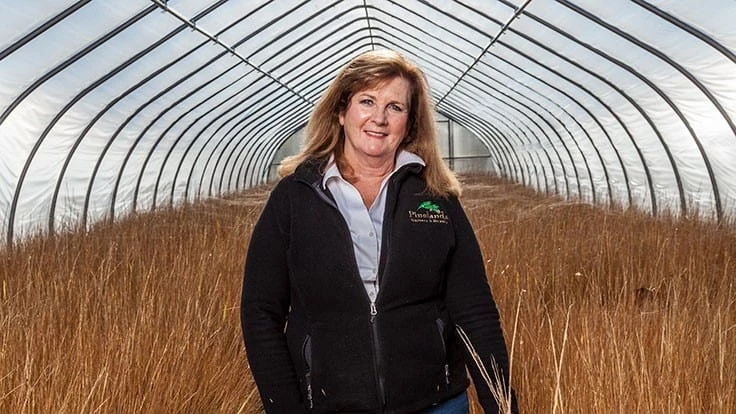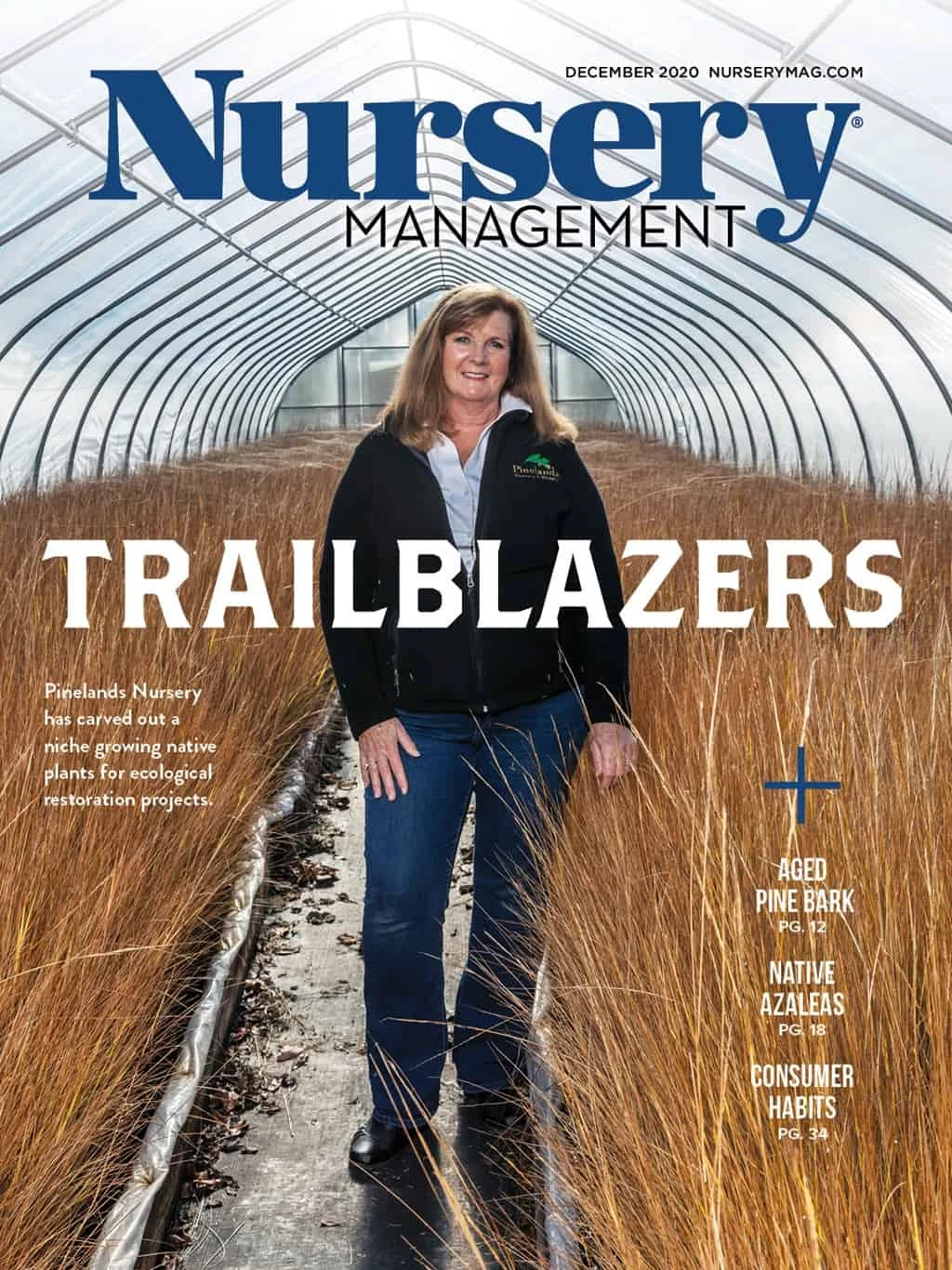
Addison Geary

Pinelands Nursery & Supply is a different sort of nursery that fulfills a different sort of need. The New Jersey company was founded in 1983 by Don and Suzanne Knezick.
The couple made the decision to make their business wholesale and not retail for what Suzanne calls a very selfish reason.
“I didn’t want to do retail because I don’t want to work Saturdays and Sundays for the rest of my life,” she laughs. “I was 25, weekends meant even more back then.”
Blazing a trail
In the beginning, Don and Suzanne sold container-grown fruit plants to garden centers. It was a nice business, but they wanted to expand and start growing wildflowers. However, Don’s interest in the propagation of native species took center stage a few years later when legislation like the Pinelands Protection Act and the Clean Water Act began to translate into natural resource restoration projects in the late ‘80s.
“Don recognized the new legislation, and requiring detention or retention basins to be vegetated,” Suzanne says. “He saw the stormwater and wastewater regulations coming in and knew there were opportunities there.”
The business pivoted to native plant production to fill the need for plants for environmental restoration projects. It’s been a lucrative business, with city and state departments of environmental protection working to undo decades of pollution and ecological nightmares. Pinelands works with governments, nonprofits and general contractors, and the New Jersey nursery has developed a reputation as a go-to source for the DEP-approved native plants they need for the job.
Fran Chismar has been with Pinelands for 13 years and counts “sultan of sales” among his titles. He’s never worked anywhere quite like it. Like the founders, he loves native plants, and he believes they were trailblazers to address the market for environmental restoration projects before it truly existed.
“What I find interesting when Suzanne and Don talk about it is there was no business model for this,” he says. “They had to find their own lane. Today, if there’s a topic, like wetlands or native plants, you can find a million conferences to attend — at least before COVID — to learn about them, or books. But that didn’t exist. They had to really listen to what their customers wanted.”
A different market
Today, 95 to 98% of Pinelands’ business is restoration projects. This presents several challenges that typical ornamental nurseries don’t have to face. First, there’s almost no renewable business. It’s job-driven, and many of those jobs come from government initiatives, whether city, state or federal or nonprofit organizations.
“For our business to boom, there has to be either a natural disaster or a man-made disaster,” Fran says. “Like a hurricane. Or when they widened the turnpike in N.J., the widening impacted wetlands and they had to create all-new wetlands to mitigate that. That’s how our business comes about.”
Despite the fact that Pinelands started working on environmental restoration projects more than 20 years ago, it’s still a viable business model. Fran says the amount of competitors in the field has nearly tripled since he started with the company. The ongoing efforts to improve our environment through regulations continues, most recently with the U.S. Environmental Protection Agency’s National Pollutant Discharge Elimination System (NPDES) Phase II stormwater regulations.
As much as she’d like to believe the world will fix itself, Suzanne thinks Pinelands will still have a niche providing plants to clean up ecological messes many years from now.
“In 2019, we had our best year ever,” she says. “We were looking forward to expanding on that, then COVID-19 hit. Our industry did not quite reap the benefits that the ornamental industry did. We had a decrease in sales this year, but with the steps we took, we’re remaining profitable.”
Of course, 2020 has been a year full of oddities, and any project that required government funding was considered questionable, at best. Tom Knezick, production analyst at Pinelands and one of Suzanne and Don’s sons, explained how quick action when the pandemic began helped the company stay afloat when the projects dried up.
“The way February and March were going, we thought we’d keep riding that wave from the year before,” Tom says. “But it was in about a week span when we realized coronavirus is real, this is going to be a big issue.”
The uncertainty of the pandemic meant any government-funded ecological restoration projects would be shifted to the back burner. To prepare for the fact that many jobs would get pushed back or cancelled completely, the Pinelands team had to make some hard decisions. The company’s biggest expense is labor, so that was the place they decided to cut back on spending. Typically, Pinelands has a seasonal crew of about 25 people. Early on, before the Small Business Administration began offering Paycheck Protection Program loans and the Coronavirus Aid, Relief, and Economic Security (CARES) Act was passed in late March, Pinelands decided not to bring the seasonal workers back for 2020.
“We thought, ‘We have to preserve the business because if there’s no business then everyone’s out of a job,’” Tom says.
But the missing labor force didn’t mean that production ground to a halt. Everyone in the office pitched in so that plant material would be ready when the jobs start up again.
“We were all hopping on potting lines and helping unload wagons because we didn’t bring in that seasonal workforce,” Tom says. “If you look at our top line, we took a 25-30% hit compared to last year. But profitability-wise, we’re not quite as profitable as we were last year but we still made money. Which I know a lot of people who go direct to landscapers can’t say this year.”
Another challenge of the ecological restoration business is what to grow. Because there’s no renewable business, it’s difficult to know what you’ll need and how much of it you’ll need on a year-to-year basis.
“You can have a baseline of what you sold the last couple years, but you can have one type of plant where you get a request for 30,000 one year and zero the next year,” Fran says.

Fortunately, restoration sizes are small which lets the grower be flexible.
Propagation is also different at Pinelands than at a typical ornamental nursery, in that 95% of what they grow is from seed they collect themselves, either locally or in the wild. While other nurseries may buy liners or graft, because of the limitations of growing for the ecological restoration market, Pinelands’ growers have to collect the seed and have a place to store it. And because the state frowns upon making profit off of what is collected on their lands, Pinelands collects on its own property or that of private entities that will allow them to collect seed on their property.
One of Pinelands’ biggest sellers is smooth cordgrass. The nursery has to collect seed from multiple sites along the coast of New Jersey because some restorations will specify that the plant must be grown from seed that came from within 50 miles of the job site — an added difficulty.
As Pinelands specializes in wetland and salt marsh plant material, even the way the seed is stored is different than a typical seed bank. Some seed is even stored in brine.
Certain plants may be native all over the country, but they might have different characteristics in different parts of the country. With seed collection in New Jersey, Virginia and New York, Pinelands is able to propagate plants that are genetically adapted to local conditions. In the late 1980’s, the nursery started supplying coir logs and mats for streambank stabilization and bio-engineering projects. The company now also offers a full line of erosion control blankets, hydro-mulches, geotextiles and silt fence, which led to the name change to Pinelands Nursery & Supply. In 2006, Pinelands introduced its own custom-blended seed mixes for stormwater management basins and construction sites.

A peaceful transition
After 35 years as president of Pinelands, Don retired. On Jan. 1, 2019, Suzanne took over as president. Their sons, Tom, who serves as production analyst, and Steve, who is seed production manager, are both involved in the nursery. Suzanne had been there since the beginning and handled the books the whole time, so she knew the business extremely well. Still, with Don stepping away, her employees needed to get used to a new management style.
“I give a little more leash to my managers to run their areas,” Suzanne says. “They’ve all been here a long time.”
It’s true. Facilities manager Paul Montrey recently celebrated 27 years with Pinelands and Susan Noval, Pinelands’ nursery manager, has been there nearly as long.
“My dad was like a safety net when it came to the nursery,” Tom says. “When he and my mom started, he did every job there: he was the salesman, he was the delivery driver, he was the propagator. As he started to bring on people who could do one task better than he could, he still knew how to do them and still had a big say in how they were done. When we had that transition of power, my mom said, ‘you know how to this job better than I do so I’m going to let you do it.’ I saw a lot of managers say ‘I had this idea for five years but I knew your dad wouldn’t go for it. But I want to try it now.’ So they’d go to my mom for approval and she’d say ‘you know the job better than me and I trust your instincts.’”
Suzanne appreciates the efforts the next generation is making to improve their business, as well, like the Native Plants, Healthy Planet podcast (see sidebar).
“Tom and my other son Steve are the future of this nursery, and I’m learning that it’s very important to bring younger people into your business,” she says. “You get used to doing things a certain way. Well, times are changing and you have to change with it. When you bring in young people with fresh ideas and they know how people their age want to deal with things, that’s really important to keep your business moving forward and changing with the times.”

Explore the December 2020 Issue
Check out more from this issue and find your next story to read.
Latest from Nursery Management
- John Ruter shares UGA's latest woody and herbaceous ornamental plant breeding projects
- Conor Foy joins EHR's national sales team
- Pantone announces its 2026 Color of the Year
- Syngenta granted federal registration for Trefinti nematicide/fungicide in ornamental market
- Get to know Kayela Aeppli
- HILA 2025 video highlights: John Gaydos of Proven Winners
- Q&A with Justin Bartlett
- Be the best choice





